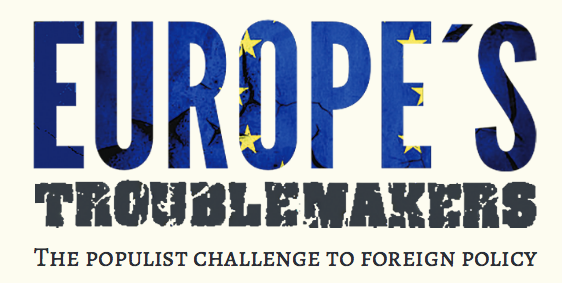Hardly a day goes by without someone within Europe's political establishment warning about the dangers of 'the populist challenge.' In fact, the influential think tank Carnegie Europe recently asked a group of experts - mostly from other pro-EU think tanks - the (loaded) question 'Will Populist Parties Run Europe?' Several think tankers answered that populists were already running Europe! This assessment is in line with the picture that many (broadsheet) media have been painting for years now. The 'rise' of (particularly right-wing) populism has been a major story since the 1990s, despite the fact that the results have been quite mixed.
One of the more recent concerns is that populist parties are influencing foreign policy, and not just the usual (European integration and immigration policy) but also positions on, for example, Russia. Oddly enough, there is little academic research on the foreign policies of populist parties, particularly in Europe, which are supposed to be mainly concerned with domestic issues.
A recent European Policy Center (EPC) report, the result of a working group of academics and think tankers of which I was a member, provides one of the first comprehensive analyses of the impact of populist parties on a host of foreign policy issues: European integration, foreign and security policy, international trade and the Transatlantic Trade and Investment Partnership (TTIP), and migration policy. The general conclusion is encouraging, at least in light of the often alarmist and sensationalist statements in the media: 'contemporary European populists on both the left and right have so far shown limited transformative power in terms of their ability to determine actual policy choices' (you can read the full analysis in the freely downloadable report here).
But while most populist parties still function more as a blocking force than as a source of viable alternatives, they could become real 'troublemakers' in the future. To prevent that from happening, the report makes a range of suggestions, which are directed at all liberal democratic forces, not just the 'mainstream political establishment' of the major political groups in Europe - i.e. the Christian Democrats (EPP), the Social Democrats (S&D), and the Liberals (ALDE).
First and foremost, liberal democratic forces should reframe the debate. This means, among others, that the deficiencies in the way our democracies work need to be acknowledged and addressed! Politics is not primarily about fighting your challengers' ideologies; it is about creating a positive and credible alternative. Rather than become the victims of the 'troublemakers', mainstream politicians should shape the debate according to their own worldviews and principles.
Second, and related, 'outpopulising' the populists does not pay off! In fact, if the mainstream simply tries to steal their clothes, disaffection with traditional politics will push populist leaders onto more radical ground. Moreover, by doing this, mainstream politicians risk confirming in the public's mind the very shallowness and attachment to power that the populists accuse them of.
Third, the media often pay disproportionate attention to populist actors, while many tabloids (and a growing number of broadsheets) even amplify the populist messages, which give the population the false impression that populists are more important than they really are. But while the media should address this challenge, if only for the sake of good journalism, mainstream politicians also need to work harder to recapture the media space by offering alternative narratives couched in comprehensible language.
Fourth, foreign policy makers should bring the international-domestic loop into the debate. International issues and the way they affect people's daily lives need to be brought into the public debate more proactively, with explanations of circumstances and issues, and ideas to address them.
Fifth, the mainstream needs to connect with those groups in society who are not part of their 'old constituencies' and thus can only be reached through novel routes. The key thing mainstream politics should copy from the populists is their online success. It's not with populist leaders that liberal democratic politics should engage, it's with citizens! This means that traditional politics needs to engage with new networks of citizens to find alternative alliances between citizens and politics on international matters.
Sixth, break the link between critical positions on the EU and Eurosceptic populism. It is legitimate to challenge the holy grail of European integration. The slogan that 'more Europe' is the only solution is no longer credible; it has the unintended effect of widening the divisions over European integration. Listening to citizens' concerns and engaging them in analyzing the solutions that the EU can provide, or those which are better addressed nationally or locally, can help occupy that space and devise more legitimate and inclusive policies.
Seventh, and final, no communication strategy can save an unconvincing and ineffective policy! Mainstream politicians have been trying to win public support through 'There Is No Alternative' (TINA) approaches. This has been a cause of disaffection and has opened the door to populist alternatives, however unrealistic and simplistic they may be. Political and institutional representatives need to invest more time in exploring how to explain complex policy responses in non-technocratic language, highlighting that solutions exist, however complicated, and that they are underpinned by different worldviews and principles to those advocated by populists. To do so, policy solutions need to be explained and their practical application needs to be communicated, using fact-based arguments linked to a broader vision that provides a sense of direction.

